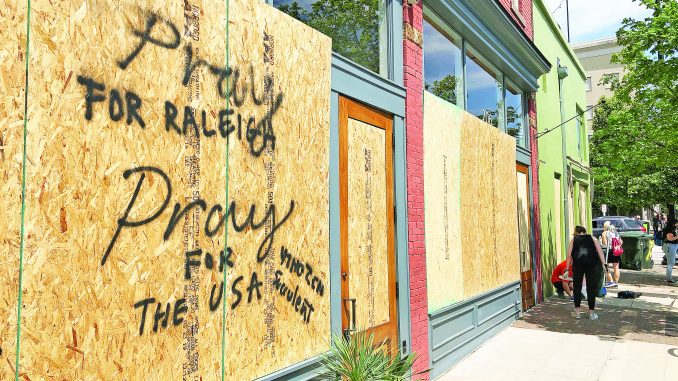
RALEIGH — As the summer draws to a close, the number of people visiting downtown Raleigh is down nearly 75% from this same time last year, a number that reflects why the city is still reeling from coronavirus lockdowns and the aftermath of the riots that swept the region this spring and summer. Shutdown orders that went into effect this past spring forced most downtown office workers to telecommute, depriving the area’s restaurant industry of its key clientele. The Oak City’s downtown was hit doubly hard when just one week after restaurants were finally allowed to reopen at half-capacity, protests in the wake of George Floyd’s death turned violent. Demonstrators vandalized restaurants and looted numerous Raleigh businesses, even setting fire to some along the way.
Bill King, president and chief executive of the Downtown Raleigh Alliance, says a quarter of businesses downtown still have their windows boarded up more than two months after the civil unrest took place and that due to the coronavirus many workers are still staying home. “We don’t have very many office workers back yet, and we don’t have a lot of visitors back yet at hotels.” Downtown Raleigh Alliance is providing grants to businesses to help them stay afloat and promote themselves as things gradually improve, focusing its efforts on “safely activating downtown,” as King puts it. “We are doing scavenger hunts, encouraging people to exercise and walk downtown,” he said. “Even if you’re not comfortable yet going to a business, having more feet on the street is helpful.”
Still the question remains when if ever most downtown workers will feel it is safe to return to an office and dine outside their homes. The Wall Street Journal cited a recent survey of 15 major employers across the nation including Boeing Co., Salesforce.com Inc., and Lowe’s Cos. that collectively employ about 2.6 million people. Of those, 57% said they had decided to postpone their back-to-work plans because of recent increases in Covid-19 infections. A separate survey of 30,000 North American workers conducted over the summer found that roughly 70% aren’t interested in returning to an office anytime soon. Most people prefer a flexible model that allows them to come into an office some days and stay home others. Economists conclude that until a vaccine is readily available, and people feel safe going back out into public, the tourism and hospitality industries will remain some of the biggest losers.
Charlotte’s downtown region, also known as Uptown, has seen a similar loss in tourism and visitors over the last six months. Bryan Holladay, who owns and operates Charlotte Public Relations, says the city’s hospitality industry has been devastated by the pandemic. While the Charlotte City Council set aside $8 Million in grants to help the city’s ailing hotels, restaurants, and bars and to help offset the economic drought the industry is experiencing, Holladay says it has not been enough. “Each week there is a new announcement of a business closing – most recently it was The Wooden Vine, a popular bistro in the heart of downtown. Despite the City Council’s best efforts, grants and PPP loans are just stop gaps. What restaurants and hotels really need are paying customers to return. This is why some Charlotte private bars are opening, even though it is violation of the Governors mandate,” he says.
Michael J. Smith, President & CEO of Charlotte Center City Partners, an organization geared towards promoting the economic, cultural and residential development of Charlotte’s downtown, agrees. “From the corner office to the corner coffee shop, the pain is real. This has been one of the most challenging times our businesses, especially our small businesses, have ever faced. The personality of our Center City is driven by these small businesses, smart entrepreneurs and by so many in the world of hospitality who have faced tough choices throughout this pandemic.”
Smith says he is optimistic that the Queen City’s centrally located business district offers a unique opportunity for the downtown area to bounce back from the pandemic. “Our position of strength comes from our exceptional talent and the differentiating assets we created in the prior cycle, including the most prolific decade for the development of new office, hotel, and residential space in the Center City,” he says. “This includes four million square feet of new office space recently delivered, under construction, or in active planning; 4,000 new hotel rooms; top talent who continue to choose Center City as their home; and jobs announced by major companies who are committed to Center City including LendingTree, Truist, Honeywell, Ally, and Lowe’s.”
Charlotte’s economy took another hit earlier in the summer after the Republican Party announced it was moving the long-anticipated Republican National Convention to Jacksonville, FL instead. Holladay says the lack of a convention has been devastating to the hospitality sector.
“Earlier this summer there was hope that the RNC Convention would be the savoir for the hospitality industry. Our company was planning $100,000 events for clients, there was an expectation that the convention would bring in over 100 Million dollars in economic impact to the city,” he says. “The combination of the pandemic and politics erased any possibility to make money off the convention. Only Westin Hotel and few select companies were able to provide services for the smaller convention. For our company the RNC Convention just ended up being a big waste of time and resources.”
Mohammad Jenatian, President of the Greater Charlotte Hospitality & Tourism Alliance (HTA) has worked in Charlotte’s hospitality industry for over 40 years. His clients include a variety of different businesses such as hotels, restaurants, bars, food service companies, attractions, transportation companies, professional sports teams, conventions & event venues, event planning companies, architects, construction companies, banks, and malls. He is among a group of local leaders who spent the past 25 years trying to bring the Republican Convention to Charlotte and says he was saddened by the sudden change in plans.
In a recent letter to his members, Jenatian offered this perspective on things. “Granted, our whole universe has changed since the COVID – 19 pandemic started a few months ago and this convention is a minor fraction of what was expected to be one of the biggest tourism and economic development events in the history of the Charlotte region. Yet, securing this event and dealing with the political fiasco of losing it and getting it back again is still a significant part of the journey that some of us have been on to make Charlotte a major travel destination and an economic hub of our nation.”
Jenatian stands by his belief that Charlotte’s vibrant economy will rebound, and says it recently surpassed San Francisco as being the 15th largest city in the country. He says that while the RNC would have done wonders for the downtown and surrounding areas, Charlotte still has a lot to be proud of in terms of what it can offer visitors as well as residents.
In the short term, local leaders in both Raleigh and Charlotte are taking steps to try to lure visitors back. The NC Department of Commerce has established a job retention grant program and the Charlotte City Council has already approved $8 Million in grants dedicated to assisting hotels, restaurants, and bars that are located within the city limit of Charlotte.



